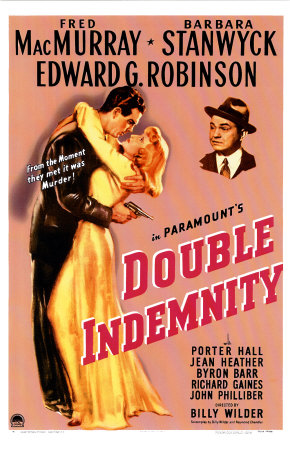
Till the Film course happened to me, I watched Film Noir just the way i watched any other film-without analysing, taking in whatever flickered on the screen before my eyes.
So we were made to watch Double Indemnity, directed by Billy Wilder, on Saturday.Apart from studying the specific features of Film Noir in it, it was also interesting to note the fully loaded wordplay that couldnt afford to use frank sexuality owing to the regulations imposed by the Department of War Information that was operational in 1944,when the film was released.
The most interesting aspect of this film, and any Film Noir for that matter, is the way the two sexes are constructed. The woman is ofcourse the Femme Fatale (played by Barbara Stanwyck)who is the bad girl, carefully constructed with the physical pointers of the Gun, the Lipstick and the Cigarette.She is the amoral woman,bordering on immorality who decides to kill her indifferent husband after suffering years of a boring marriage.
The man (played by Fred MacMurray) belongs to an equally ambiguous moral standing as the woman.He kills for money (under the garb of love)after cold bloodedly chalking out each minute detail,has a torrid affair with a married woman,cheats on her by being extremely close to her step daughter and misuses the trust his colleagues lay on him. Infact,it is him who introduces the idea of murder into the woman's head.
But the script provides a neat portion to the man which he uses to confess his murder that helps him "redeem" himself in the eyes of God and the audience and brings him back to the position of the Good Christian man that every hero is meant to be. Playing along with the concept of poetic justice,he dies at the end of the film but not without gaining the sympathy of the audience.
The woman,on the other hand, is shot by the man shortly after she cant bring herself to shoot him. It is interesting to note that moments before her death, she was bordering on the realms of amorality and was threateningly close to the realm of morality as she began to talk of how her heart didnt allow her to fire the bullet at him, before being silenced by the bullet he fires.
What I find problematic is how he is allowed a chance to "redeem" himself and she is killed just when there was a possibility of a similar "redemption" for her.I do not say that she would have actually spouted words of love that would pull her back to being a Good Christian woman, but the problem is that the script didnt give her that chance.
In the narrative of the man who makes sure he is "redeemed" at the end, we do not come to know of what the woman would have done had there been a similar scope for her,and all we end up with,is a series of "What If"s in our heads.
P.S: the opinions expressed are totally personal and i do not mean to push them down anyone's throat.
